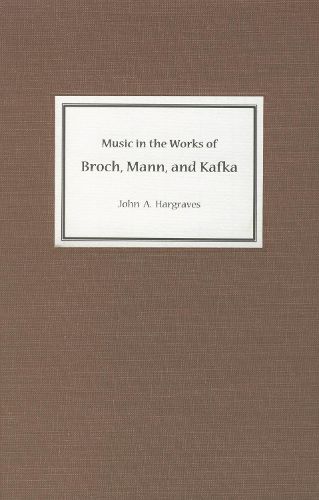Readings Newsletter
Become a Readings Member to make your shopping experience even easier.
Sign in or sign up for free!
You’re not far away from qualifying for FREE standard shipping within Australia
You’ve qualified for FREE standard shipping within Australia
The cart is loading…






The German Romantic critic Friedrich Schlegel saw music as a paradigm of art, and wished to bring the qualities of music to literature. Schopenhauer saw in music a direct manifestation of the Will, and thus as the highest form ofart. This study examines the ironic influence of these and similar ideas of music’s primacy among the arts on three of the most important modern writers of German: Hermann Broch, Thomas Mann, and Franz Kafka. Of the three, Broch takes Schlegel’s idea furthest: His novel The Death of Vergil uses the constructive techniques and sonorities of music to extend the cognitive reach of his writing to the non- or supraverbal, and Hargraves traces similar concerns across Broch’s career. Unlike Broch, Mann saw in musicality a peculiarly German access to the dark forces within the human psyche. Music is the “glass’ through which the reader sees the development of the anti-hero Hans Castorp in Mann’s Magic Mountain. In Doktor Faustus, on the other hand, the hero Leverkuhn conjures with demonic powers to create fictional music; his "strict style’ is itself an allegory of the political realities of the 20th century. Kafka admitted that he had little appreciation for music, but two of his important shorter works. "Josefine the Singer,‘ and "Investigations of a Dog,’ transform this "unmusicality’ into an enigmatic essay on the uses and limits of art. Hargraves uncovers surprisingly parallel concerns among these three very different writers.
John Hargraves is assistant professor of German at Connecticut College, New London, Connecticut.
$9.00 standard shipping within Australia
FREE standard shipping within Australia for orders over $100.00
Express & International shipping calculated at checkout
The German Romantic critic Friedrich Schlegel saw music as a paradigm of art, and wished to bring the qualities of music to literature. Schopenhauer saw in music a direct manifestation of the Will, and thus as the highest form ofart. This study examines the ironic influence of these and similar ideas of music’s primacy among the arts on three of the most important modern writers of German: Hermann Broch, Thomas Mann, and Franz Kafka. Of the three, Broch takes Schlegel’s idea furthest: His novel The Death of Vergil uses the constructive techniques and sonorities of music to extend the cognitive reach of his writing to the non- or supraverbal, and Hargraves traces similar concerns across Broch’s career. Unlike Broch, Mann saw in musicality a peculiarly German access to the dark forces within the human psyche. Music is the “glass’ through which the reader sees the development of the anti-hero Hans Castorp in Mann’s Magic Mountain. In Doktor Faustus, on the other hand, the hero Leverkuhn conjures with demonic powers to create fictional music; his "strict style’ is itself an allegory of the political realities of the 20th century. Kafka admitted that he had little appreciation for music, but two of his important shorter works. "Josefine the Singer,‘ and "Investigations of a Dog,’ transform this "unmusicality’ into an enigmatic essay on the uses and limits of art. Hargraves uncovers surprisingly parallel concerns among these three very different writers.
John Hargraves is assistant professor of German at Connecticut College, New London, Connecticut.